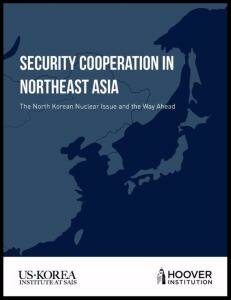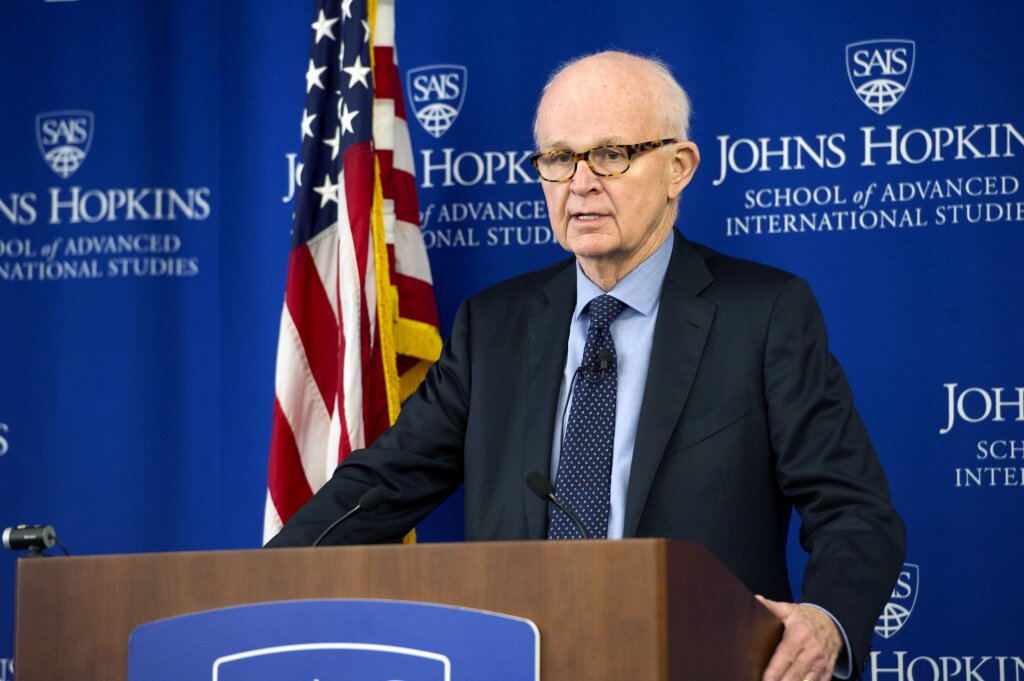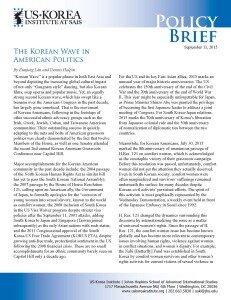Published on October 7, 2016

North Korea conducted its fifth and most powerful nuclear test in September 2016. It is also making significant progress on its delivery systems, rapidly expanding its stockpile of fissile materials, and steadily improving on its nuclear weapon designs. There is growing concern that if this process continues, North Korea could soon become a clear and present danger not only to Northeast Asia, but also to the United States.
With this in mind, the US-Korea Institute at SAIS partnered with the Hoover Institution at Stanford University to convene some of the leading experts on Northeast Asia security issues to take stock of the issue and consider what steps can be taken to stabilize the situation and halt North Korea’s development of weapons of mass destruction. The two-day conference was held at Stanford University in mid-June and was co-chaired by former Secretary of State George P. Shultz and former Secretary of Defense William J. Perry.
The following report is a summary of the main points discussed by the participants, with the primary takeaway that there is a need for a comprehensive policy review along the lines of the “Perry Process” fifteen years ago.
Download the report, “Security Cooperation in Northeast Asia: The North Korean Nuclear Issue and the Way Ahead”
Published on April 28, 2016
On April 27, 2016, Joel Wit published the article, You Can Negotiate Anything – Even North Korea, in Foreign Policy.
Published on February 23, 2016

Ambassador Stephen Bosworth, 1939-2016. (Photo: Kaveh Sardari/USKI)
Ambassador Stephen Warren Bosworth died of pancreatic cancer in his home in Boston on Monday, January 4, 2016.
Stephen Bosworth was a career American diplomat and was chairman of the U.S.-Korea Institute at Johns Hopkins School of Advanced International Studies (SAIS) and held an appointment as a Senior Fellow at the Belfer Center for Science and International Affairs at the Harvard Kennedy School of Government. He was also served as the Payne Lecturer at the Freeman Spogli Institute at Stanford University in 2014.
Ambassador Bosworth served as Dean of The Fletcher School of Law and Diplomacy at Tufts University from 2001-2013. His administration at Fletcher is credited with increasing the size of the Fletcher faculty and student body while securing the financial soundness of the school during a period of economic uncertainty. He oversaw the creation of new degree programs that have significantly expanded the scope of The Fletcher School’s teaching, research, and global outreach. During his tenure as Dean at the Fletcher School, Ambassador Bosworth also served President Obama and Secretary of State Hillary Clinton as United States Special Representative for North Korea Policy from 2009 to 2011.
“Stephen Bosworth was among the best diplomats of his generation. A consummate professional and a student of history, he managed American foreign policy skillfully at critical junctures and left an indelible imprint on America’s policy toward Asia,” said Vali Nasr, dean of Johns Hopkins SAIS, “He was a transformational dean at the Fletcher School at Tufts University where he oversaw development of new programs. Insightful, kind and considerate, he was a great influence on friends and colleagues and generations of students who studied international affairs.”
read more …
Published on November 6, 2015
The U.S.-Korea Institute at SAIS invites you to:
Tumen Triangle Tribulations:
The Unfulfilled Promise of Chinese, Russian and North Korean Cooperation
Featuring:
Andray Abrahamian
Director of Research, Choson Exchange
Honorary Fellow, Macquarie University
Wednesday, November 11, 2015
2:00 PM – 4:00 PM
Bernstein Offit Building, Rm 500
1717 Massachusetts Ave. NW
Washington, DC 20036
 The Tumen Triangle region—where North Korea, China and Russia meet—is, in many ways, the story of regional integration being held back by the political concerns of Pyongyang, Beijing and Moscow. Andray Abrahamian, Director of Research at Choson Exchange will present USKI’s latest special report which examines historical legacies, contemporary relations and shifting strategic priorities between the three countries and how they influence trade and investment in the region.
The Tumen Triangle region—where North Korea, China and Russia meet—is, in many ways, the story of regional integration being held back by the political concerns of Pyongyang, Beijing and Moscow. Andray Abrahamian, Director of Research at Choson Exchange will present USKI’s latest special report which examines historical legacies, contemporary relations and shifting strategic priorities between the three countries and how they influence trade and investment in the region.
Andray Abrahamian is the Director of Research for Choson Exchange, a non-profit specializing in training for North Koreans in business, economic policy and law. He is an Honorary Fellow at Macquarie University and was a CSIS non-resident Kelly Fellow. Andray has a PhD from the University of Ulsan, in which he examined media discourse and our understanding of North Korea and an M.A. from the University of Sussex, which focused on US-Korea relations.
Please RSVP here!
Webcast available HERE.
Published on September 11, 2015
With growing confidence in their grassroots power, Korean Americans are now networking further to strengthen their political influence through enlightening themselves about voting rights, mobilizing the community for major elections, and encouraging the next generation to be more visible and active in Washington’s political arena.
 SAIS Lecturer Eunjung Lim and USKI Visiting Scholar Dennis Halpin review the accomplishments and analyze the rising influence of the Korean American community in US domestic politics.
SAIS Lecturer Eunjung Lim and USKI Visiting Scholar Dennis Halpin review the accomplishments and analyze the rising influence of the Korean American community in US domestic politics.
Download the USKI Policy Brief: “The Korean Wave in American Politics,” by Eunjung Lim and Dennis P. Halpin.
A shorter version of this brief was originally published as on op-ed in the Korea Times on September 8, 2015. Read it here.
Dr. Eunjung Lim is currently a lecturer for Korea Studies at School of Advanced International Studies at Johns Hopkins University. Her research interests include comparative studies on democracy and local politics. She has been researching on Korean Americans’ grassroots movement as well.
Dennis P. Halpin, a former US consul in Busan and Asian affairs advisor to the House Foreign Affairs Committee, is a visiting scholar at the US-Korea Institute and an adviser to the Poblete Analysis Group.
Published on February 18, 2015
The US-Korea Institute at SAIS is seeking program and research interns for immediate hire. Multiple positions are open, duties will vary. Current areas of research include: North Korea political, economic, and social development, North Korean WMD issues, US-ROK nuclear cooperation, US-ROK cooperation in Southeast Asia, US-ROK cooperation nuclear security, US foreign policy to both Koreas, energy security cooperation in Northeast Asia, ROK renewable energy policies, and more. Candidates with a background in security and Asia issues preferred for immediate open positions.
Interns generally are asked to work on a variety of tasks including research assistance, event attendance and reporting, logistical support for events and projects, and other things as necessary. They may work with USKI staff and/or Visiting Scholars on various projects.
Successful candidates should have an interest in Korea and/or East Asia policy and be at least a sophomore in college or higher; graduate students and post-grads are encouraged to apply. Foreign language skills are a plus, but not necessary. Strong writing and editing skillls are preferred. Must be able to multitask, prioritize, meet deadlines, and work well both independently and in small groups.
USKI internships are unpaid and interns are expected to work at least 4 days a week.
To apply, please email cover letter, resume and short writing sample to Michelle Kae, Research Assistant at mkae1@jhu.edu. Only those chosen for interview will be contacted. No phone calls please.





